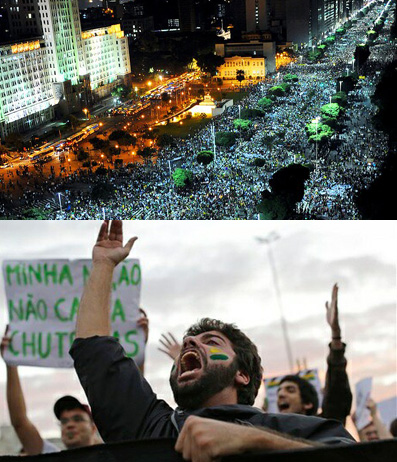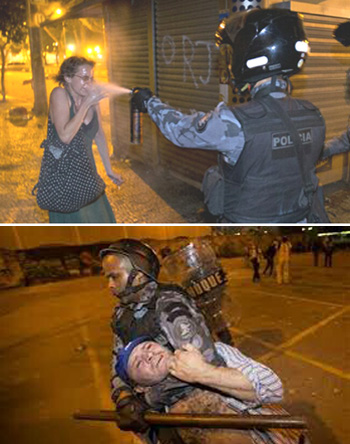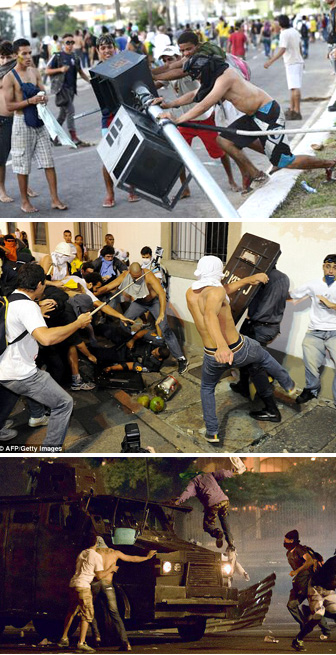International Affairs
 |
 |
 |
 |
 |
 |
 |
Echoes from Brazil
Fed up with ‘Democracy’
I assiduously read and study the articles published on the Tradition in Action website. The relevant material found on it helps me to lucidly discern the panoramas of the present day situation. This is very useful since the common man today tends to be dragged into the progressivist tornado, which aims to demolish the Holy Church, especially through the revolution unleashed by Vatican Council II. I admire the seriousness and competence with which the topics - even the more complex - are analyzed, as well as the precision of focus and the erudition of content I find in the diagnoses TIA offers the public.
Some days ago, I was surprised by a request made by Atila Sinke Guimarães, a long-time and respected friend. He asked me to present my viewpoint for TIA readers about what is happening in Brazil regarding the street demonstrations that have erupted throughout our immense territory. In some ways, this seemed to me an unnecessary task, given that the American public is already agilely served by news agencies that utilize the most sophisticated means available to keep the people informed. So, I enter this topic primarily not to refuse the request of a friend…
If any aspect of my description is not sufficiently clear, I would welcome questions from my brothers in North America. This can help me offer a more precise picture of the events taking place in South America.
 I believe that these demonstrations were inevitable. The people’s discontent - gagged by our “democracy”- reached an insupportable point of strangulation: It had to end in public manifestations or die. The people believe it is important to show this discontent now, while it is possible. They feel it is an obligation they have to defend the motherland Divine Providence gave them.
I believe that these demonstrations were inevitable. The people’s discontent - gagged by our “democracy”- reached an insupportable point of strangulation: It had to end in public manifestations or die. The people believe it is important to show this discontent now, while it is possible. They feel it is an obligation they have to defend the motherland Divine Providence gave them.
Each one receives what he deserves. For not having valued the gifts God gave them, the Brazilians now have what they deserve, a Republic that essentially does not represent the people. Now they are expressing their nonconformity with the way the country’s three constituted powers are behaving.
For example, the lack of synchrony between the Legislative powers and society is enormous. Unfortunately, the religious and military authorities are not acting differently. They simply show no care for the common good of the nation. They live in a world of their own, separate from and even opposed to the legitimate hopes and desires of the Brazilian people. The people are distressed, anxious and do not know where to turn for help.
This crisis of representation exists in every State and is all-encompassing – in the Executive, Legislative and Judiciary powers, the media, the unions, the student groups, etc. The political institutions, especially the political parties, have lost credibility before the population, to the point that the street demonstrations show open hostility toward them.
The demonstrations made against the increased price of public transportation in the medium and large cities of Brazil initially had no political connotation; shortly, however, they turned against the political parties. Activists of ultra-leftist parties like the PT (Workers Party - Partido dos Trabalhadores) or members of the MST (Landless Movement - Movimento dos Sem-Terra) were beaten during the demonstrations, forced to abandon their symbols or simply prevented from taking part in them.
It seems we are witnessing a curious disposition to fight against the power, instead of fighting to gain the power. What the participants of the demonstrations want is to oblige the power to do what it is supposed to do.
The demonstrations were organized via social networks, facilitated by the dynamics of the internet, which made persons aware that they were not isolated in their dissatisfaction with the state of affairs. The common man became aware that he was part of a much broader context and wanted to express his demands and indignation against the establishment. This general indignation ended by targeting the present day government, in particular the Workers Party and President Dilma, thus focusing public discontent at the very top of the political power.
The amplitude of the power crisis is becoming increasingly evident. There are commentators who are describing this general movement as 'a sleeping giant that woke up’ - a slogan borrowed from the marches organized in 1964 by Tradition, Family and Property. That is to say, the silent majority has awakened and does not accept the corruption it sees around it, the trademark of the status quo government (the Workers Party of Presidents Lula and Dilma).
The organized left thus feels obliged to hide what its stands for and has fought for in the past. What we are seeing is a movement made by the masses, and not a movement motivated by a single class, concerned only about its interests and allies.
Divorce between State & Nation?

 Ever-growing segments of society are endorsing the demonstrations, notwithstanding their due reserve toward the vandalism done by infiltrated elements. This sends the message that the State no longer has organic links with society.
Ever-growing segments of society are endorsing the demonstrations, notwithstanding their due reserve toward the vandalism done by infiltrated elements. This sends the message that the State no longer has organic links with society.
It seems we are seeing the realization of the prognosis made by Plinio Corrêa de Oliveira, when he warned about the danger of creating “a dramatic historic situation where the ensemble of the people of a Nation remove itself from the State, and the State lives - if this can be called living - without an authentic national representation. In other words, it is a situation when the basic laws that underlie the structures of a State and govern its life as well as that of society no longer reflect the ideals, wishes and ways of being of the Nation.
“In this situation, nothing is predictable. Violence can erupt in the surprising and catastrophic ways that can always occur in situations dominated by disagreement, passion and confusion. What path does a nation take in such a situation? At times it moves toward wise and organic solutions, which its leaders did not know how to find.”
After the demonstrations broke out, the public service department stepped back, annulling the price hike it was imposing in public transportation. The demonstrations, however, continued, taking no note of this victory. Seeing this demand satisfied, which was the initial fuse of the movement, did not end the public discontent.
It is the conservative character of the demonstrations that makes them continue. So far, the tendencies of the movement are against the left. The youth is tired of the left. There are people asking “whether the Dilma government can stand under the force of the demonstrations and the movement’s tendencies toward the right in society.”
The governor of Rio Grande do Sul, who is a prominent member of the Workers Party and known for his extreme leftism, is concerned about the situation. He recently said, “The parties of the left, if they want to be on top of this crisis, must adopt a uniform strategy of reevaluating their political action, as well as create new channels of direct democracy articulated with a representative democracy. Otherwise, we will be defeated by conservatism.”
This governor lucidly recognizes that a good part of society is conservative and is now speaking out, breaking with decades of a semi-hypnotized accommodation.
Amid the great confusion that still prevails, perhaps the most promising characteristic of the scenario is this: A vigorous public discontent broke with the strong tendency the Brazilian has to accommodate to the status quo whatever it may be.

Some days ago, I was surprised by a request made by Atila Sinke Guimarães, a long-time and respected friend. He asked me to present my viewpoint for TIA readers about what is happening in Brazil regarding the street demonstrations that have erupted throughout our immense territory. In some ways, this seemed to me an unnecessary task, given that the American public is already agilely served by news agencies that utilize the most sophisticated means available to keep the people informed. So, I enter this topic primarily not to refuse the request of a friend…
If any aspect of my description is not sufficiently clear, I would welcome questions from my brothers in North America. This can help me offer a more precise picture of the events taking place in South America.

Millions of people from large & medium sized cities took to the streets to protest the corruption of the entire "democratic system"
Each one receives what he deserves. For not having valued the gifts God gave them, the Brazilians now have what they deserve, a Republic that essentially does not represent the people. Now they are expressing their nonconformity with the way the country’s three constituted powers are behaving.
For example, the lack of synchrony between the Legislative powers and society is enormous. Unfortunately, the religious and military authorities are not acting differently. They simply show no care for the common good of the nation. They live in a world of their own, separate from and even opposed to the legitimate hopes and desires of the Brazilian people. The people are distressed, anxious and do not know where to turn for help.
This crisis of representation exists in every State and is all-encompassing – in the Executive, Legislative and Judiciary powers, the media, the unions, the student groups, etc. The political institutions, especially the political parties, have lost credibility before the population, to the point that the street demonstrations show open hostility toward them.
The demonstrations made against the increased price of public transportation in the medium and large cities of Brazil initially had no political connotation; shortly, however, they turned against the political parties. Activists of ultra-leftist parties like the PT (Workers Party - Partido dos Trabalhadores) or members of the MST (Landless Movement - Movimento dos Sem-Terra) were beaten during the demonstrations, forced to abandon their symbols or simply prevented from taking part in them.
It seems we are witnessing a curious disposition to fight against the power, instead of fighting to gain the power. What the participants of the demonstrations want is to oblige the power to do what it is supposed to do.
The demonstrations were organized via social networks, facilitated by the dynamics of the internet, which made persons aware that they were not isolated in their dissatisfaction with the state of affairs. The common man became aware that he was part of a much broader context and wanted to express his demands and indignation against the establishment. This general indignation ended by targeting the present day government, in particular the Workers Party and President Dilma, thus focusing public discontent at the very top of the political power.
The amplitude of the power crisis is becoming increasingly evident. There are commentators who are describing this general movement as 'a sleeping giant that woke up’ - a slogan borrowed from the marches organized in 1964 by Tradition, Family and Property. That is to say, the silent majority has awakened and does not accept the corruption it sees around it, the trademark of the status quo government (the Workers Party of Presidents Lula and Dilma).
The organized left thus feels obliged to hide what its stands for and has fought for in the past. What we are seeing is a movement made by the masses, and not a movement motivated by a single class, concerned only about its interests and allies.
Divorce between State & Nation?

An abusive police, above, and infiltrating vandals, below, try to present the demonstrations different from their general pacific & conservative tone

It seems we are seeing the realization of the prognosis made by Plinio Corrêa de Oliveira, when he warned about the danger of creating “a dramatic historic situation where the ensemble of the people of a Nation remove itself from the State, and the State lives - if this can be called living - without an authentic national representation. In other words, it is a situation when the basic laws that underlie the structures of a State and govern its life as well as that of society no longer reflect the ideals, wishes and ways of being of the Nation.
“In this situation, nothing is predictable. Violence can erupt in the surprising and catastrophic ways that can always occur in situations dominated by disagreement, passion and confusion. What path does a nation take in such a situation? At times it moves toward wise and organic solutions, which its leaders did not know how to find.”
After the demonstrations broke out, the public service department stepped back, annulling the price hike it was imposing in public transportation. The demonstrations, however, continued, taking no note of this victory. Seeing this demand satisfied, which was the initial fuse of the movement, did not end the public discontent.
It is the conservative character of the demonstrations that makes them continue. So far, the tendencies of the movement are against the left. The youth is tired of the left. There are people asking “whether the Dilma government can stand under the force of the demonstrations and the movement’s tendencies toward the right in society.”
The governor of Rio Grande do Sul, who is a prominent member of the Workers Party and known for his extreme leftism, is concerned about the situation. He recently said, “The parties of the left, if they want to be on top of this crisis, must adopt a uniform strategy of reevaluating their political action, as well as create new channels of direct democracy articulated with a representative democracy. Otherwise, we will be defeated by conservatism.”
This governor lucidly recognizes that a good part of society is conservative and is now speaking out, breaking with decades of a semi-hypnotized accommodation.
Amid the great confusion that still prevails, perhaps the most promising characteristic of the scenario is this: A vigorous public discontent broke with the strong tendency the Brazilian has to accommodate to the status quo whatever it may be.

Posted July 19, 2013
______________________
______________________











